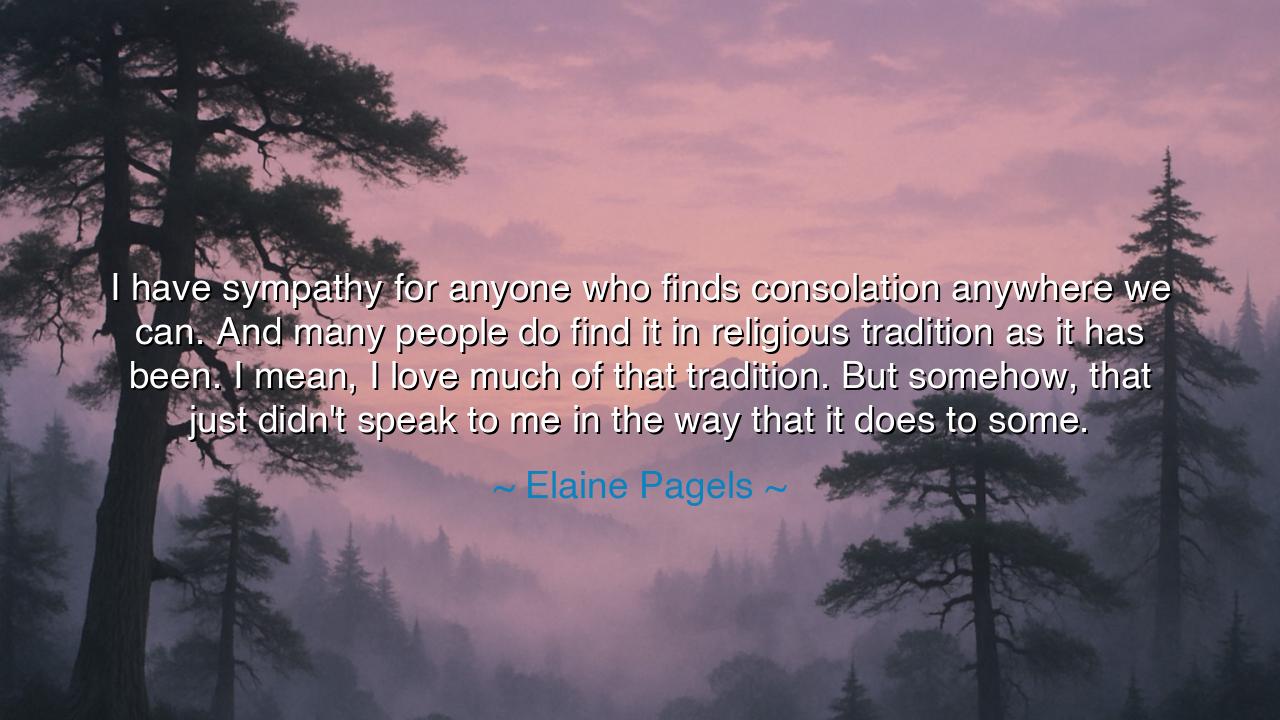
I have sympathy for anyone who finds consolation anywhere we
I have sympathy for anyone who finds consolation anywhere we can. And many people do find it in religious tradition as it has been. I mean, I love much of that tradition. But somehow, that just didn't speak to me in the way that it does to some.






In the ancient quest for meaning and consolation, humanity has sought comfort in many places—be it in gods, goddesses, philosophies, or rituals. Elaine Pagels, in her words, “I have sympathy for anyone who finds consolation anywhere we can. And many people do find it in religious tradition as it has been. I mean, I love much of that tradition. But somehow, that just didn’t speak to me in the way that it does to some,” speaks to a profound truth about the human condition—that we all search for solace in our own way, shaped by our experiences, desires, and individuality. Just as some find refuge in the sacred texts of religion, others seek their comfort in different forms, from the philosophies of the Greeks to the scientific revelations of our modern age.
In the ancient world, religion and ritual were the cornerstones of society, the foundation upon which communities built their lives and understood their place in the cosmos. The Greeks had their gods, the Romans their emperors, and the Egyptians their divine rulers. Yet, even among these great civilizations, there were those who felt an inherent disconnect between the official doctrines of their time and the truths they sought for themselves. Socrates, the great Greek philosopher, is a prime example. He was deeply skeptical of the traditional beliefs of his society, choosing instead to seek wisdom through reason and dialogue. His pursuit of truth did not conform to the established religious traditions, yet it brought him great influence. Like Pagels, Socrates recognized that not all would find the same consolation in the gods or rituals that were handed down.
Pagels’ words reflect the universal reality that not everyone finds peace in the same way. The philosophers of ancient Greece often grappled with the tension between individual belief and the collective norms of society. Aristotle, for instance, sought truth not in divine revelation, but in empirical observation and reasoned thought. Though he admired the ancient myths, he believed that human happiness could be achieved through rational living and moral virtue. In much the same way, Pagels acknowledges the power and value of religious tradition, yet admits that, for her, its teachings did not provide the same meaning or comfort as they did for others. This internal conflict—between personal belief and societal expectation—has echoed through the ages, from Socrates to Pagels, as individuals seek to find their own path to consolation.
Religious traditions have long been a source of solace for those in need. Saint Augustine, one of the most influential Christian thinkers, wrote extensively about how faith provided him with a sense of purpose and comfort amid the struggles of his early life. For Augustine, religion was not just a set of doctrines but a deep personal connection to the divine. Similarly, Rumi, the Persian mystic, found solace in Sufism, a spiritual path that sought union with the divine through love, poetry, and mystical experience. Rumi’s works continue to inspire millions around the world because they speak to the deep human need for consolation, not through rigid structures, but through a personal and experiential connection to the divine. Like these great figures, Pagels respects the power of religious traditions, yet acknowledges that for some, the traditional path may not provide the same fulfillment.
In every culture, there are those who find comfort in the traditions of their ancestors, and others who must forge their own path. Buddhism, for instance, offers a stark contrast to the Judeo-Christian traditions, focusing not on divine worship but on the personal journey toward enlightenment. Siddhartha Gautama, the Buddha, turned his back on the established religious structures of his time to seek a deeper truth within himself. His teachings of mindfulness, compassion, and the Middle Way offer a path of peace and consolation to millions, yet they are distinctly different from the Western religious traditions that often emphasize belief in a personal god. Pagels, in acknowledging that religion did not speak to her in the same way, mirrors the Buddha's rejection of the conventional spiritual path in favor of something more personal and introspective.
The lesson we must take from Pagels’ insight is one of respect and understanding. Not every soul finds peace in the same form of worship, nor does every person experience the divine in the same way. Some may seek solace in the rituals of religion, while others may find their consolation in philosophy, art, or science. The diversity of human experience means that each person must embark on their own unique spiritual journey, one that is shaped by their personal history, struggles, and understanding of the world. It is important, then, to offer respect to those who may not share our path, understanding that their search for meaning is as valid as our own.
In our own lives, we must remember that consolation is found in many places, and each person’s journey is their own. Whether through religion, art, philosophy, or nature, the search for meaning and comfort is universal, but the methods by which we seek them are deeply personal. Let us not judge others for the paths they take, but support them in their quest for peace, knowing that each journey is a reflection of the soul’s deep desire to understand the world and find solace in the face of life’s challenges. In honoring this diversity, we find a deeper understanding of the human spirit and a greater connection to one another.






AAdministratorAdministrator
Welcome, honored guests. Please leave a comment, we will respond soon